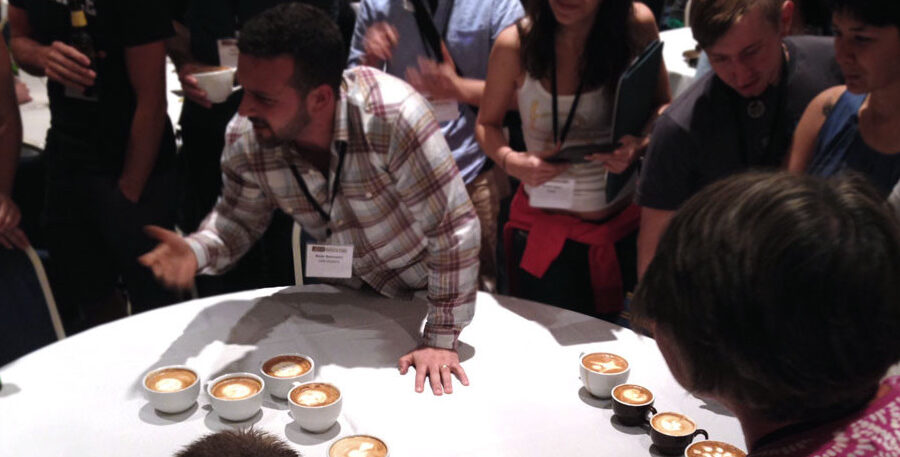“[H]a, there’s actually a camp for baristas? You’re not serious. What do you guys do, sing ‘Kumbaya’ and drink espresso?”
This conversation with my friend on the topic of professional development for baristas had not started well. When I told him I had joined the Barista Guild of America (BGA), his reaction was less than charitable.
“Nice one. Did you also join the Royal Order of Blacksmiths or some other noble organization for pretend professions?”
This exchange, and several others like it, have happened to me in the years since I became a member of the BGA. I’m enthusiastic about the educational opportunities available to baristas, so I talk about the certifications, camps, classes and workshops that serve as a foundation for development every chance I get. I’m not surprised by the reactions I receive anymore, but they still frustrate me. Why is it so strange that baristas would want to educate themselves, improve their skills and learn more about their craft?
Even more, why is it strange to other baristas that such opportunities exist for them?
What I seem to forget in those disheartened moments is that I too was surprised that there was more to coffee than the basics. For a long time, I just thought coffee was brown and tasted good.

When I started my career in coffee in 2001, I thought that all there was to know could be found on the side of a bag: roast level, country of origin, basic brewing instructions. What else could there be? In fact, even as I moved through the industry and increased my knowledge, I genuinely believed at each step that I had plumbed the depths of available information.
“Ah, coffees are processed differently sometimes. Interesting! I wonder if that affects the flavor.”
“Wait. Coffees don’t have to be roasted longer to taste better?”
It wasn’t until 2009 that I really understood how much there was to know—and how little of that I knew. At that point in my career, humility finally overpowered hubris, and my real education in coffee began.
Professional development for baristas doesn’t look much different than it does for any other profession. Individuals take classes that are both theoretical (customer service) and practical (grinding, dosing, tamping and extracting) in an attempt to elevate their ability to execute the expectations of their job with excellence. The breadth of training options available to baristas today is staggering. There are the requisite basic courses, like introductions to espresso, cupping and brewing, but there are also a wealth of advanced classes that run the gamut from learning latte art to being more efficient (and effective) on bar. The classes are taught by subject matter experts who have experience in the coffee industry and in coffee shops doing exactly what they’re teaching.
The efficacy of taking these classes all at once became most evident in 2010 when the BGA started Camp Pull-A-Shot, a retreat for baristas from around the country that acts as a three-day crucible of sorts meant to produce passionate, well-trained coffee professionals. That first year was so successful that a second-annual camp joined the first in 2011.
Today it’s just called Barista Camp, and the focus has expanded slightly to include a broader range of classes, including some that were historically offered primarily to Roasters Guild members. There is still room for evolution, though. As more baristas progress through their personal development and get into material that requires more dedicated commitment, the name Barista Camp represents the activities less and less. If we want our professional development to be taken seriously by those outside our industry, naming it something with more gravitas might be a step in the right direction.
But by whatever name it’s called, this camp is incredibly valuable, and not just for new baristas. For trainers, taking the entry-level classes is a great way to see other people training the material you teach every day. You’ll learn new terminology, fresh analogies and different ways to say familiar things. For experienced baristas, there are courses that will melt your face off. Espresso Exploration, a Level 3 class, is a mind-altering experience that will change your perspective on espresso extraction forever.
Equipment manufacturers find value in the elevation of the barista profession as well. Companies like La Marzocco, Nuova Simonelli, Wilbur Curtis and Bunn all send representatives and equipment to camp to help teach and share their expertise on the machines that baristas are already using. Do you have a question about why your steam wand is acting funny? Ask it! Are you thinking about adding a hot water tower to your back counter? Try some different options to see what fits you best. It’s all available.
All of this development culminates in official certifications that tell the coffee industry that you know what you’re doing. Whether you have a rudimentary knowledge of coffee and espresso basics at Level 1 or a grasp of more advanced techniques and methods at Level 2 and 3, certification is a giant step in the direction of having a common language that everyone in the coffee industry speaks. When I hire a person who is a Certified Level 1 barista, I know that when I order a cappuccino, he or she will make a proper, delicious drink. That confidence is empowering.
A chance for growth I know that people outside the coffee industry may laugh at the idea of a Barista Guild or a Barista Retreat. I mean, I’d probably laugh if I heard there was a Butchers Guild or a Cheese Monger Retreat. But within our community of baristas, I hope there is an excitement about the possibilities presented by growth within our profession. There are people who have made it their career to give all of us the opportunity to improve. How can we not take advantage of that?
















